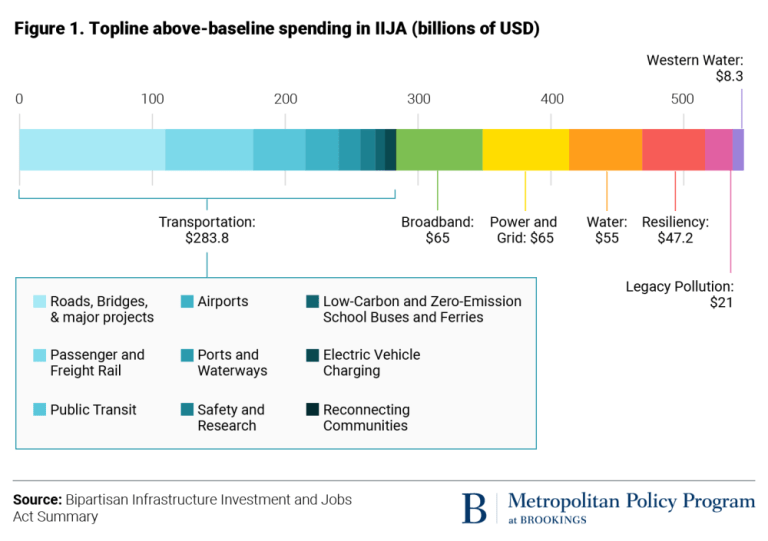
The 2,702-page Infrastructure Investment and Jobs Act contains $550 billion in new spending. The $1.2 trillion figure comes from including additional funding normally allocated each year for highways and other infrastructure projects. The new spending includes:
- $110 billion for roads and bridges. In addition to construction and repair, the funding also helps pay for transportation research at universities, funding for Puerto Rico’s highways, and “congestion relief” in American cities.
- $66 billion for railroads. Funding includes upgrades and maintenance of America’s passenger rail system and freight rail safety, but nothing for high-speed rail.
- $65 billion for the power grid. The bill would fund updates to power lines and cables, as well as provide money to prevent hacking of the power grid. Clean energy funding is also included.
- $65 billion for broadband. Includes funding to expand broadband in rural areas and in low-income communities. Approximately $14 billion of the total would help reduce Internet bills for low-income citizens.
- $55 billion for water infrastructure. This funding includes $15 billion for lead pipe replacement, $10 billion for chemical cleanup, and money to provide clean drinking water in tribal communities.
- $50+ billion for cybersecurity and climate change. This resilience funding will protect infrastructure from cybersecurity attacks and address flooding, wildfires, coastal erosion, and droughts along with other extreme weather events.
- $39 billion for public transit. Funding here provides for upgrades to public transit systems nationwide. The allocation also includes money to create new bus routes and help make public transit more accessible to seniors and disabled Americans.
- $25 billion for airports. This allocation provides funding for major upgrades and expansions at U.S. airports. Air traffic control towers and systems would receive $5 billion of the total for upgrades.
- $21 billion for the environment. These monies would be used to clean up superfund and brownfield sites, abandoned mines, and old oil and gas wells.
- $17 billion for ports. Half of the funds in this category would go to the Army Corps of Engineers for port infrastructure. Additional funds would go to the Coast Guard, ferry terminals, and reduction of truck emissions at ports.
- $11 billion for safety. Appropriations here are to address highway, pedestrian, pipeline, and other safety areas with highway safety getting the bulk of the funding.
- $8 billion for western water infrastructure. Ongoing drought conditions in the western half of the country will be addressed through investments in water treatment, storage, and reuse facilities.
- $7.5 bill for electric vehicle charging stations. The Biden administration asked for this funding to build significantly more charging stations for electric vehicles across the nation.
- $7.5 billion for electric school buses. With an emphasis on bus fleet replacement in low-income, rural, and tribal communities, this funding is expected to allow those communities to convert to zero-emission buses.
Above details are from Investopedia
- Requires the Department of Transportation mandate all new passenger motor vehicles be equipped with “advanced drunk driving prevention technology that can passively monitor and accurately detect that a driver is impaired”. (Causes)
- Requires the DOT to study a national motor vehicle per-mile user fee that will assess fees on drivers based on the amount driving they do. (Causes)
The package’s spending provisions are partially offset by:
- Repurposing approximately $210 billion from unused COVID-19 relief funding provided by Congress.
- $56 billion in forecasted economic growth
- $53 billion from states returning unused enhanced federal unemployment supplemental funding
- $28 billion from applying reporting requirements to cryptocurrency.
The package is projected to increase budget deficits by $256 billion over the next decade according to the Congressional Budget Office. (Causes)
Read a full summary of the Infrastructure Investment and Jobs Act here.
Read a summary of the bill’s environmental and climate impact at Grist
Read additional summaries at CNN, Forbes, Brookings, and Time.
What the bill does for Indiana
Under the Infrastructure Investment and Jobs Act signed into law last week and not supported by any Indiana republicans, Indiana will get $9 billion:
- $6.6 billion to improve highways. The money will allow INDOT to expedite ongoing projects, including the expansion of I-65 and I-70 to six lanes. In Indiana there are over 5,478 miles of highway in poor condition.
- $401 million to repair and rebuild bridges. In Indiana there are 1,111 bridges in poor condition.
- $100 million over five years to support the expansion of the an electric vehicle charging network in the state.
- More than $750 million will go toward improving the state’s water systems.
- $40 million to prepare more of our infrastructure for the impacts of climate change, cyber attacks, and extreme weather events. From 2010 to 2020, Indiana experienced 34 extreme weather events, costing the state up to $10 billion in damage.
- $20 million over five years to protect against wildfires.
- $20 million to protect against cyber attacks.
- A minimum of $100 million will be used to help improve broadband internet access across the state. It will provide access to at least 217,000 Hoosiers who currently lack broadband infrastructure.
- $170 million will go toward infrastructure improvements at the state’s airports.
25% of this funding will go to local road projects. All of the investment is expected to happen over the next five years.
Between fixing bridges and expanding highways, the construction industry is expecting a big boost, too and thousands of jobs. “The Indiana Chamber of Commerce said the spending is well worth it. “We simply couldn’t let our infrastructure further deteriorate and burden business and citizens alike,” Indiana Chamber CEO Kevin Brinegar said. “This is the type of long-term, needed commitment to improve the state and nation’s infrastructure system that we’ve sought for more than a decade.”” (WTHR)
“We have discussed the need to make desperately needed investments in our infrastructure and broadband technology for too long,” Indiana Democratic Representative Frank Mrvan told the NWI Times following the House vote. “Today, we delivered.” (WTHR)

